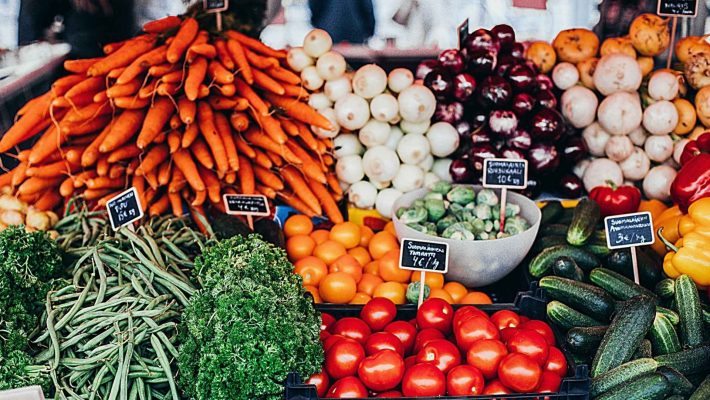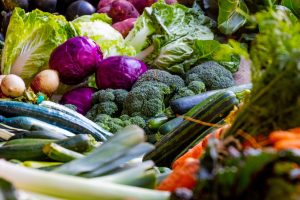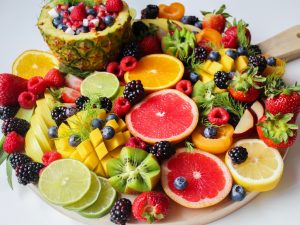Organic food is the food that grows without using any synthetic chemicals.
These are free from fertilizers, pesticides, and insecticides, or GMOs. There are many benefits of organic food, but you must be vigilant. For a food product to be organic, it must be from an organic farm and it must be free from any artificial additive such as artificial sweetener, color, preservatives, and flavorings. Organic meat and dairy products are the ones wherein the animals feed on organic fodder and grow without the use of hormones or steroids.
Recently there has been an enormous spike in the demand for organically grown food, and good reason.
Organic farming uses natural compost and manure as fertilizers. It is the sustainable way forward because, unlike chemical fertilizers that render the soil infertile in the long run, organic manure improves the quality of the soil. Chemical fertilizers also tend to pollute underground water and are generally harmful to the environment. Organic meat and dairy products don’t have any chemical pesticide residue in them and therefore are healthier than conventional meat and dairy products.
Benefits of organic food
But why organic diets are the way to go? Let’s discuss the benefits of organic food for our health and why they are better for the environment:
Organic food is safe from ill-effects of pesticides
Pesticides are a few of the most persistent chemicals. Even if you make sure to wash the fruits and vegetables thoroughly before consumption, some residue of pesticides persists and finds its way into your body. Studies have linked prolonged exposure to pesticides, fungicides, and insecticides used in conventional farming to cancers and birth defects. Organic farming does not rely on these synthetic chemicals and uses natural and organic fertilizers and pest control methods. Thus, organic foods do not have any harmful side effects on our health.
It tastes better
Fruits and vegetables grown with the absence of any pesticides or GMOs retain their natural taste. There are no artificial flavor enhancers such as sweeteners or colorants to distort their natural flavor. Synthetic chemicals increase the shelf life of fruits and vegetables artificially. Organic food, therefore, is fresher when it reaches us.
Organic food is nutritious
There is a growing amount of evidence that suggests organic food is more nutritious than food grown conventionally. Organic vegetables and fruits contain higher levels of antioxidants, vitamins, and minerals. These are beneficial to our health when compared to their conventional counterparts. Organic milk and meat contain more omega-3 fatty acids that help in better managing our blood pressure and keeping our heart healthy.
It is GMO-free
Genetically Modified Organisms have their DNA engineered or altered. Such modifications do not exist naturally in nature. If it does not occur naturally, clearly, we must not consume it either. Organic food is free from GMOs and hence is the best way to steer clear of them. Eating clean, GMO-free food leads to better overall health.
It is free from antibiotics and synthetic hormones
The use of antibiotics in animal farms allow the farmers to raise more animals in limited space without the fear of them contracting any diseases due to unhygienic conditions. These antibiotics find their way into our bodies and seriously affect our immune system. Animals often receive artificial growth hormones for unnaturally quick growth and weight gain, to produce more meat, or to produce more milk. Such synthetic hormones can increase the risk of cancer in humans. Organic meat and dairy are free from traces of antibiotics and hormones. They boost immunity and reduce the risk of cancer.
 Organic foods benefits the environment
Organic foods benefits the environment
The chemicals used in conventional farming are harmful to the environment. They pollute the water bodies underground and around the farm. The usage of chemical pesticides directly harms the birds, animals, and people living near the farm. Organic farming promotes fertility and improves soil health. Healthy soil produces healthy food and creates a healthy environment.
Organic diets are sustainable
Organic farming is sustainable. It is good for our planet in the long run. Instead of causing harm to the environment, it benefits the ecosystem. It keeps the soil healthy and fertile and does not contaminate water, directly benefiting the future generations to come. It is the only way in which we can meet the ever-growing needs of the present without compromising the ability of our future generations to meet their needs.
Hence, there are several vital benefits of organic food.
Food plays an important role in our overall health and well-being. The method of growing food has a big impact on its nutritional benefits. Even though organic food is more expensive than conventionally grown food, the health benefits of an organic diet are immense. Completely switching over to organic food overnight might be an overwhelming thing to do. Make small but sure changes bit by bit and see the benefits for yourself.







